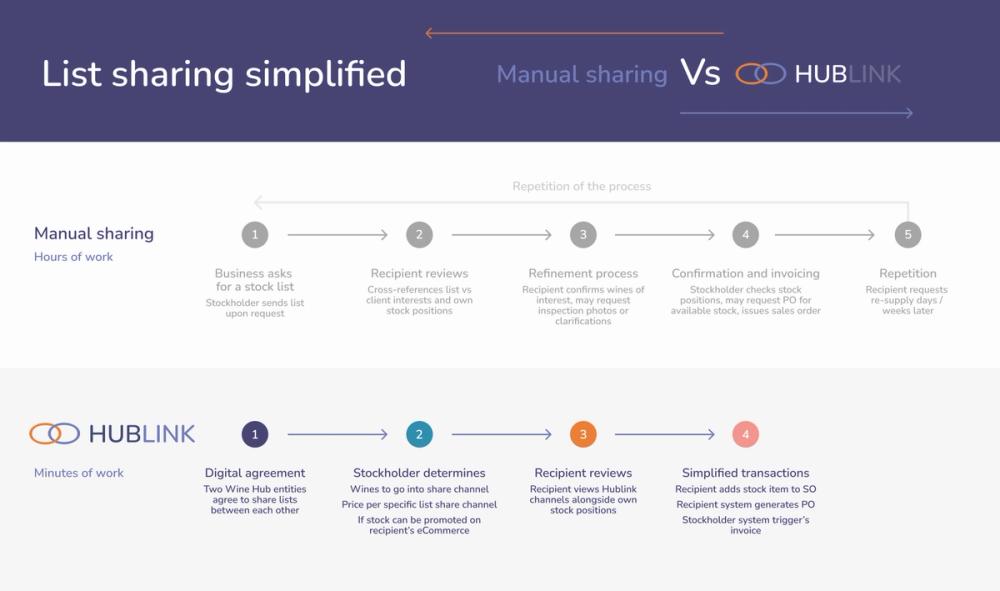Hublink is Wine Owners’ bold new step in transforming how the fine wine industry connects stock positions and improves the flow of B2B transactions. Building on the success of Wine Hub – a ground-breaking industry-specific software as a service (SaaS) business management platform – Hublink gives merchants, importer-distributors and producers (well-established and start ups) the ability to share verified stock through trusted, permission-based relationships. It replaces slow, error-prone list sharing with real-time access, connection-specific pricing and powerful new sales opportunities.
This next stage of development comes after five years of working closely with wine businesses to understand their biggest pain points and remove the administrative burdens holding them back. says Nick Martin, co-founder and chief executive of Wine Owners.

Hublink is the culmination of Wine Owners listening and talking to wine businessess of all sizes across all channels to find out where they need the most operational help, says Wine Owners' founder Nick Martin
“We are constantly talking to customers about where they are spending a lot of their time, wrapped up in things that are administratively heavy, or in activities where they see growth opportunity,” says Wine Owners chief Nick Martin. “You are looking at how much time they are spending doing different things and how operationally efficient or inefficient they are.”
That’s one of the key benefits that Wine Owners has been able to potentially bring to its customers on top of developing industry-specific computer-based business management systems for them. In order to make sure its core platform is delivering what its customers want it to do, Wine Owners really need to get under the skin of how wine businesses operate and where their big pressure points are.
“One of the things that kept coming up was the challenge they have in essentially sharing stock with each other,” says Nick Martin.
Which is particularly the case in fine wine, “where there is a ton of list sharing going on in the market”. Which is understandable in a market where fine wine businesses have “finite resources to tie money up in stock”, and yet, want to be able to offer their customers as much wine as possible that fits their market positioning and target market.
So much of the fine wine sector’s time, he adds, is taken up with “Company A” calling up “Company B” and asking them for their list so that they can see if they have wines they, or a customer, might want. If they do, there is then a lot of “going back and forth” between each other to agree on a price, and to make sure that a wine is still available and that their list has not changed.
“It is a painful, endless process that can absorb hours of time each week,” says Martin.
Introducing Hublink
Wine Owners has now come up with a new simplified, systematic process it is calling Hublink which will allow fine wine companies already using its Wine Hub platform to “digitally shake hands with each other” over the transacting of a particular wine on a merchant’s list. But crucially that merchant can determine which wines on their list the buying company gets to see and can personalise the price of each wine on the list depending on the relationship they have with each other.
It means stockholders can hold back wines they know they can easily sell themselves, away from the main trading market, and use wine market relationships to more easily find buyers within their addressable market.
Hublink will effectively manage that whole process right through to sending out automated sales and purchasing orders between all parties.
“We think by doing that it will help put the right product in front of the right people, wherever a principal relationship resides, and will save an inordinate amount of time in repetitive and time consuming processes that create an administrative burden,” adds Martin.
He is quick to stress this is far from being a trading marketplace, but rather is a digitised, automated way of sharing lists far more effectively and efficiently than before, on a one-to-one “permissioned” basis, with other businesses whom you expect to do business with.
It is particularly useful, adds Cox, for fine wine merchants that have a preferred list of companies with whom they are routinely working and sharing lists with, as they can each be connected to a stockholding merchant through Hublink and then get access to only the wines the stockholder wants to sell, via the relationship that offers the lowest price available. That can help with margin.
“It’s super easy and super intuitive and can easily be part of your work flow,” adds Cox.
It can also be used in real time, so if you are on a call with a customer who is placing an order for a specific wine, but then asks about another wine you can quickly access Hublink to see what is available in the market, at what price and where it is being stored, facilitating upselling.
“It is giving you flexibility, it is super efficient and allows you to supplement and meet your customers needs without committing to holding excessive levels of stock,” adds Cox. “Holding stock is fine when the market is going up, but when it is volatile many of our Wine Hub businesses don't want to be sitting on stock that ties up capital for long periods.”

Supporting start-ups
Hublink also has the potential to help newcomers and start-ups come into the fine wine sector as it removes the need to have a lot of stock and capital committed up front. It potentially takes away those “inhibitions”.
“It allows you to source to demand without having to commit to capital,” claims Cox. “You can put that capital into other areas to grow your business.”
You could, for example, start up an eCommerce site, sign up to Wine Hub and use Hublink to supplement the wines that are listed. Many fine wine businesses are already using Liv-ex exchange offers with the deep integration with Wine Hub doing exactly that, adds Martin, bringing in new clients and, in a buyer’s market, achieving good gross margins on sales.
“The more options that people have the easier it is for them to start up in business.”
As with other sources of third party supply, including Liv-ex, it allows wine merchants to diversify into other regions where they may not currently have stock, and use Hublink to test and source wines from different countries and regions, says Cox.
It also allows merchants to build deeper relationships with people and businesses they already trust, meaning they only work with those they want to, or selectively helps them establish new trading relationships, adds Martin.
Build connections, boost trade
Hublink can also help importer-distributors to list more of their producers’ wines listed across a wider set of retailers and merchants.
It clearly has a lot of potential for the exclusive agency importers who could use Hublink to forge deeper relationships with their producer partners by offering them so many more routes to market for their wines.
Wineries and importers know the profile of retailer or merchant they want to have representing their wines and different parts of their portfolio. Wine Hub represents a substantial premium and fine off-trade choice of sales partners. In this scenario a distribution business requests a connection to those wine businesses they want to connect with, and with whom they’re not already working. At its core Hublink is about building out a community of carefully selected relationships.

“It’s all about connectivity,” says Martin. “Hublink is about building a network of connections within a growing market-leading ecosystem of businesses using Wine Hub.”
“If we are able to make it easier to do things that are time consuming and increase liquidity and activity by say 10% that’s £60m of transactions of businesses selling to their customers that otherwise might not have happened,” explains Martin. “We think that is significant.”
Industry specific solutions
Which is what Hublink is all about.
“We would never have surfaced this need five years ago,” he agrees. “It comes out when you are talking to people and you are trying to understand how you can really positively impact their business. Hublink came out of that process. Time and time again people would talk to us about how many hours a week they would spend working off different people’s lists.”
It is also an initiative that taps right into the part of the wine industry that Wine Owners historically focused on. The long tale of SME wine companies where “most people do collaborate and if the market is doing well overall, they will also do well,” explains Martin.
It is particularly the case in the fine wine sector where there are “so many possibilities of product and you just can’t carry them all,” says Martin.
It is also a sector that is in the midst of what has been a three year downturn and fine wine merchants are looking for benefits, growth drivers and any savings they can find. “They were not prepared for how long it has turned out to be,” claims Martin. “It has probably been the longest downturn since the 1970s.”
“It means you have to make sure that every penny you are spending, you are spending in the right place,” says Cox.
If companies make full use of Hublink it has the capacity to “cut out hours of work a week whilst enabling you to sell more,” he adds. “That’s crucial in the current market.”
“It’s opening up more channels for you and the more channels and paths you have to consider for developing your business the more resilient your business is going to be,” says Martin.
Best in class

Wine Owners' John Cox: "We are trying to help create a set of standardised workflows within an industry that by nature is very fragmented"
Wine Owners is well positioned to see which wine companies are responding to the market challenges best and what it is they are doing to make the most of growth opportunities in a challenging market.
“The customers that we have that are doing the best have really drilled down into their e-commerce,” says Cox. “They are trying new things, reflecting the behavioural demands and expectations of their online audiences.”
That’s where there has been a "significant" increase in the levels of revenue now coming out of online over the last couple of years, where businesses figure out what works for them and what drives engagement, adds Martin.
But that also brings new challenges around handling online costs of sale and fulfilment (which can quickly mount up) and margin management, he adds.
“That’s extremely important for anyone selling online,” says Cox.
Wine Owners have also seen far more wine companies of a certain size and scale needing to professionalise the way they work in the last couple of years. The roll out of the new duty regime and EPR regulations has also helped focus minds to invest in the right business management support services.
“If you were a start-up you would (or at least should) not hesitate to spend a certain amount of money on investing in business-building and laying the foundations for growth,” says Martin.
Wine Owners is in a good position to help start-ups scale their businesses by being able to give them the systems support they need at a time when they have limited resources, adds Cox. Increasingly they see start ups are led by experienced wine professionals who are looking to break out of the corporate world and run their own companies.
That mentality applies equally to established businesses.
“We enable you to make better use of the resources you have. You can bear down on your expenses and do more with what you have, thanks to operational efficiencies (meaning the team can crack on with what they’re good at), at the same time growing market reach which is realisable when you sell via multiple channels concurrently.”
Martin is keen to stress that Wine Owners’ success is intrinsically tied to the success of the companies it is working with.
“We are interested in people’s businesses. We are interested in how technology can help drive these operational efficiencies and open up paths for growth. We are much more interested in what it does rather than what it is, if that makes sense,” he says.
Cox adds: “We are trying to help create a set of standardised workflows within an industry that by nature is very fragmented, and help the industry to coalesce around the common sense processes that participants all understand. Then they can have a common standard around what they are doing within the business.”
The final word goes to Martin who sums up Wine Owners aspiring client base: “Those moving on to Wine Hub have a shared desire to improve their business, to want to be a ‘better’ business tomorrow than they are today.”
* You can find out more about the work and services of Wine Owners at its website here.
* Wine Owners is a commercial partner to The Buyer.






























